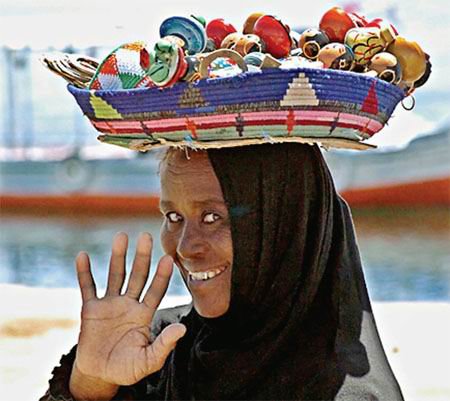
Egyptian Businessmen’s Association: Making a difference …
By Hoda Nassef
The Egyptian Businessmen’s Association (EBA) is not a gentleman’s cigar club, nor a simple NGO (non-governmental organization) - but a group of serious businessmen evolving our way of thinking, and our way of life in Egypt.
I was not disappointed when I met two of the silent pillars of Egypt, Mr. Said El-Tawil and Mr. Aly Gamal El-Nazer. Both gentlemen emanated an aura of ‘savoir vivre’ and elegance, which cannot be faked, and that only true culture, authentic pedigree, honourable background, and a lifetime of industrious hard work, hones finely and finally into an image of success.
MR. ALY GAMAL EL-NAZER was born in Aswan, Upper Egypt, on 22 January 1930, and was educated in Cairo achieving his Bachelor’s degree from the Faculty of Commerce, Cairo University, in 1950. He then earned his Master’s Degree from Pittsburgh University (U.S.A.) in 1964. Alongside his studies, Mr. Aly Gamal El-Nazer was a professional athlete in various fields, such as in basketball, water polo, swimming, tennis, and is affiliated to many clubs and associations belonging to the elite sports clubs and sports federations in Egypt. His pinnacle of athletic success was during the sixties, when he won several bronze, silver and gold medals in local and international water polo competitions. His sports activities culminates and continues up to the present date, as he was elected, amongst other federations, Member of the Rotary Club in 1983, and Chairman of the Egyptian Lawn Tennis Association, also in 1983, up to the present date.
If THAT didn’t impress you, take a look at his past career! His first job was in 1950 as a Research Worker in the Ministry of National Economy. Twenty-four years later, in 1974, he was General Manager at the Ministry of Economy. One year later, he was promoted to Under-Secretary at the Ministry of Economy, then in 1976, First Under-Secretary. In 1977, Mr. El-Nazer was selected as Vice Minister in charge of the Investment Authority. In 1978, Mr. Aly Gamal El-Nazer was elected as Minister of State for Economic Cooperation. Then again, Mr. El-Nazer became Minister of Tourism & Civil Aviation in 1979 until January 1982.
Added to his prestigious achievements, Mr. Aly Gamal El-Nazer is a Financial and Economic Consultant; Chairman of the Sporty International Foot Ware Co.; Chairman of Karoon Co. for Investment & Development; Chairman of the Joint Arab Co. for Hotels & Tourism and Chairman of the Egyptian Businessmen’s Association, since April 2002.
Upon first meeting Mr. Aly Gamal El-Nazer, I noticed an expressive honest face and eyes that didn’t shift or flinch! He talked with a soft cultivated rumbling voice, which immediately put me at ease. And so, the tape rolled on….
Q. Sir, what is the EBA?
A. It’s a non-governmental and non-profit organisation. It’s different from other organisations like the federations of industries and chambers of commerce, because we are much larger in scope than they are. We have professionals with us and we have public sector people, but it is an NGO with our focus on how to serve the business community at large, and in particular our members. And, we consider ourselves as consultants to the government on various economic, financial and technical matters.
Q. Wasn’t the government recently trying to clamp down and control NGOs, because of the fear that NGOs are trying to control the government? Could you clarify this clash?
A. It’s not really a clash. I think the government realises that some of the NGOs, especially those that are financed from sources outside the country, could work in a way that may not be in the interest of the Egyptian government, or Egypt as a whole. In our case, we are different. First of all, all our members are Egyptians. They have to be Egyptians. Secondly, all the members are decision-makers in their own organisations. Thirdly, we don’t accept donations or grants from the government, or from any other source, whether locally or from abroad. We are self-dependent, as far as finances are concerned.
Q. What were the main targets in forming this EBA? Did it start off like a group of friends with similar interests, such as a club?
A. Exactly! Yes, it started that way. It started as a group of friends who felt they shared the same problems and wanted to find solutions to their problems. As a matter of fact, it started in an office of one of the founding members. Anyhow, after the group was formed, the idea caught the interest of others, and when the number of members started to grow, they decided to make it legal and create the Association. The new law states that all NGOs have to be registered, and you have to have regular meetings at regular time-schedules, and financial balance sheets have to be presented to its members on a routine basis. Law 153/1999 is a legal framework that guides all associations, as well as proves that everyone is abiding by the law. This does not mean that they restrict our movements. All that the government wants, really, is to know what you are doing.
Q. On the other hand, does the EBA sometimes influence the government?
A. Yes, it does, because we give the government the opinions of the Egyptian citizens, which are derived from their day-to-day work. Their working experience is valuable, and we offer their ideas to the government. On the other hand, although the government is made aware of their opinions, this does not mean that it always accepts them. We are sort of a like a sounding board for the general public.
Q. Do you, as an organisation, personally help out in financing, consultancies and training, or do you resort to foreign companies or hire experts from abroad to implement this?
A. We get from time to time possibilities, or rather offers, for training our own members. These are in the form of aid and donations, through the government, from foreign companies sometimes, or international institutions, and are mainly for upgrading the know-how, managerial skills and capabilities of the Egyptian private sectors in general.
Q. How many members do you have? And, how can one become a member?
A. The EBA comprises, more or less, 450 members. Our members deal professionally in all types of activities. For instance, some are in industry, some in tourism, some in agriculture, some in construction and some in technology. Other professionals are bankers, lawyers, etc. In fact, we have members who are professionals in all conceivable fields.
Q. That means the EBA has a representative for everything. For instance, I read that you have a representative for the COMESA shipping line?
A. Yes. We have representatives for various fields and business venues. Let me clarify something. As EBA members, we are organised in various Committees. For instance, we have Industrial Committees, Agricultural Committees, Maritime Shipping Committees, Tourism Committees, Petroleum Committees, Banking Committees, Export, Import and Trade Committees, and so on.
Q. What about educational committees?
A. Well, this is under the umbrella of several fields of education. It would not only mean elementary education, but includes different aspects and areas. If we talk about education, then we include higher education, technical education and researchers. So, this is the job of more than one committee.
Q. What criteria does a person need in order to become a member?
A. We are very particular and selective in accepting members. EBA has a panel that screens them heavily. The results come to our Board Members to give the final decision. The candidates must also be relatively successful businessmen in their own private fields or companies. We don’t screen candidates because we are not convinced of their capabilities. On the contrary, we are, but we screen them to eliminate people who try to become members for ulterior motives, or who would abuse the Association by trying to influence the government in parliamentary votes, or to have more power in political sects, and so forth.
Q. If you like, this could be off the record. I’m sure you have heard of the banking corruption lately, plus other types of corruption…..
A. There was not a single member, I’m glad to say, who had anything to do with the recent scandals, or was in legal trouble or had trouble with the government at all. Thank God, not once was a member in disgrace for any reason whatsoever. We are very happy about that, and very proud about it too. But, we don’t help members financially. One of our policies is that we do not assist members or support personal cases coming from EBA members and their relations, families or friends.
We don’t take personal issues and go hammer the government to solve their problems. However, we would take a case from a member of EBA, only if his personal problem reflects on us all, and in the long run would help the community at large. If such a crisis would arise in the future, and a member needs some financial help, we probably would assist him, yet while doing so, it would give a bad example to other people (members or not) who might want to profit from that situation and maybe abuse the Association. Therefore, we try to avoid such things, and so far such personal problems have not arisen.
Financially, this could happen to anyone. Now there is an economical ‘squeeze’ all over Egypt, and all are members feel that squeeze. But what we try to do in the way of help is more in the nature of preventing such crises to occur, by training members in finance and other issues.
Q. How were you elected as Chairman, and how did you replace the former Chairman, Mr. Said El-Tawil?
A. By voting. We have a voting system in implementing this. Every year, one-third of the Board Members go for elections. We are eleven Members of the Board, so every year four Board Members are changed, through elections. He may be changed, and may be re-elected. And, after the Board Members have been elected, they in their turn nominate a Chairman from amongst the eleven Board Members. Annually, they also elect the Vice Chairman, the Treasurer and the Secretary General.
I was chosen exactly a year ago, last April. By the way, our elections are always in April, but this year it will be delayed a bit because a new law decree was issued, and according to this new law, we will have to wait until October. Mr. Said El-Tawil was re-elected several times. He was Chairman for over twenty years. He expanded and improved the EBA, and did a lot for our business association and the business community in general. He is now our Honorary Chairman for life, since last year. This is the least EBA can offer him in appreciation.
Q. Do your members have different political affiliations and views?
A. Yes, definitely. But we don’t allow our political affiliations or differences to affect the EBA. On the other hand, some of us don’t have any interest in politics at all. However, when we issue our statements after our meetings, we usually send a summary or our Minutes of Meetings to Members of Parliament for them to use during their parliamentary debates. From time to time, we also invite MPs to our meetings to get their views as well.
Q. What do you get out of this? What do the members gain, on a personal level? And what does EBA gain, as an association?
A. I think it helps us individually in our work. For example, several business problems that we faced and confronted the government with were solved in many cases. As individuals, we find that this is also technically very useful for us, and I think that if we did not profit from the EBA to some degree, people would not be so keen on joining us, or care to remain members of the EBA. Why should one be a member of an association, attend meetings, pay annual subscription fees, if one doesn’t benefit personally as well? Naturally a member has to feel that he reaps some minimal benefit for himself – for his personal input, knowledge, time, effort, and money.
Q. What type of benefits did you imply?
A. First of all, he has access to very valuable information pertaining to his field and specialisation, and info of other sectors and fields. He acquires through the EBA information concerning export and import possibilities. Also, unlike other associations, he has the opportunity to meet foreign VIPs or delegations visiting Egypt. Two weeks ago we had a delegation from Turkey and another delegation from the U.K.
Q. Have you become a powerful group in Egypt?
A. Yes. I can say that we are the most important association in Egypt, simply because we are totally independent. We never take any money from any source, so if you look at our Annual Report, you will see that it is statistically very accurate, precise and is very technical and important. Furthermore, we distribute annually these reports to all embassies, ministries and chambers of commerce. We are like a ‘small Egypt’ and our reports reflect the general Egyptian community regarding financial, economical and social aspects of life here. And, we are not biased, so our reports are given with accurate statistics without being objective or biased to any particular political or religious affiliation.
Q. Could you please state your views about the war on Iraq’s impact on the Middle East in general, and Egypt in particular? And, what, if anything, are you (EBA) doing about in now, or intend to do in the future?
A. Concerning this issue, for now all we can do are symbolic gestures. We have to view the consequences of this war in the scopes of short and long terms. In the short term, it’s a disaster for Egypt’s economy. No doubt about that. Take tourism alone, for instance. It has dropped to zero. Exports are crumbling because of the maritime and airlines’ apprehensive situations.
Q. Speaking about trade and export, since Egypt needs new countries or export outlets, don’t you think that this is an appropriate time to take advantage of West and South-African exportation opportunities, and to promote the COMESA shipping line while doing so?
A. This is a good angle to work on. We have to try that and to search for new markets. But, you know, these things take time. Hopefully, when this war is over, and the sooner the better, we would play an important role rebuilding Iraq.
Q. How do you intend to give a hand in rebuilding Iraq? Do you mean by donations, technical know-how, or manpower?
A. Rebuilding Iraq would cost in the range of 50 to 60 billion dollars, at least, and this would be a good chance for our numerous construction companies to participate in its actual construction. Our numerous factories that produce building material could also take part in the process. Agriculture and landscaping engineers could also take part, and so forth.
Q. That’s great! What about finishing building Egypt? As a foreign friend once told me: “Egypt is one big construction site!” Nothing is ever complete!
A. When we make money out of building Iraq, we can then afford to finish the construction sites in Egypt! I forgot to mention that as individual businessmen, apart from the association, we all care for our country, and love Egypt, so nearly all the members contribute donations in one form or another. Some donate to their home villages, or build orphanages and schools, while others donate to the poor through their mosques or their churches, for example. I think this applies to a lot of Egyptian citizens who are not members of the EBA, and depends mainly on their income and charitable natures. But, the EBA donates to the government only for large-scale national crises, such as after big floods, terrorism attacks and earthquakes.
Q. What were the major activities of EBA during the past year, and where are you going from there?
A. We feel that Egypt’s main problem is the problem of productivity. We have to produce more. The majority of the Egyptian factories are working on a one-shift basis, and in some cases, less than one shift. Our goal is to make these factories work in two shifts and even three shifts in some cases, to produce more. This is only one way to increase production, and then we have to find another way to sell the products as well.
We should not be limited to the Egyptian market alone, and should aim at manufacturing and exporting sundry and variable products abroad. We are capable of doing so, and we are working on many systems and networks that help in the exportation of Egyptian products abroad. EBA even had several conferences to look into the problems that are impeding exports in some areas.
Q. Are some of the problems due to bad management, or bad finishing of products? Add to the list, a bit of laziness?
A. It’s a bit of all that, and more.
Q. So, do you think that you have to re-train the people, or re-train their way of thinking, amongst other training programmes?
A. Our problem in the past was that the price that you paid for a local product was much higher that the same imported commodity. In other words, the price that you got locally was much higher than the export price. Secondly, the quality (‘finishing’) could be better. So, on our priority list, we are also trying to improve the quality of our products, if we aim at exporting them abroad, and reach the same level of quality standard and competitiveness, even locally. With the devaluation of the Egyptian Pound, we are becoming competitively ‘price-wise’. Thirdly, what we need most at this stage, is somebody to tell us what to produce and where to sell it!
Q. According to your expert knowledge, what are our main export items? And what could we promote for exportation that we have not explored yet?
A. Different building material is an area that we could explore and expand. We are already very competitive in cement, iron and ceramics. Look what the Koreans did with their construction companies! At one stage, they were all over the world, taking contracts and bringing into their country foreign exchange. We could do the same. We could be very successful in Africa where there are opportunities for lots of construction.
Other Egyptian industries and items to promote include cotton, leather, textiles, furniture, carpets and rugs. Or our Egyptian experts in water treatment and desalination plants, architects, lawyers, researchers, educational professors and doctors. Last but not least, Egyptian experts in technology and in all the areas of IT. Take another example: India is exporting computer programmes for five billion dollars a year! Israel is exporting computer programmes for three billion dollars yearly. We have the same skills, intelligence and know-how here in Egypt, so why not use it as a commodity?
Therefore, we could expand and develop our own economy not only by exporting concrete commodities, but also in various abstract forms, such as I just mentioned, and in training or teaching other companies in other countries. We only need to be well organised and better disciplined. Finally, we need the people who have the experience to tell us where to go and what to do about it. Or rather, we need foreign contacts that have the experience to direct us and know how to handle such manoeuvres.
Q. You mentioned a while ago that our factories could increase its labour shifts. With so much unemployment in Egypt, and increasing annually, why doesn’t the existing factories extend the work-shifts in order to hire more labourers, while at the same time increase their productivity rate?
A. Because the factories don’t have the market in order to increase their production. If our factories have the markets for exporting their goods, then they would hire more labourers and increase its productions. It’s a ‘vicious circle’ in a way: a factory cannot increase its production unless it has a buyer, and at the same time it cannot hire more labourers unless it intends to increase its production. Also, it’s not a question of bad industry, but more a question of getting more involved in the international market.
There is now an agreement with the European Union (EU) to lift trade borders for import and export. If we use our resources efficiently, we can gradually improve the development of our economy. Imagine, Egypt is exporting only four billion dollars’ worth per year, which is considered way beneath its actual capacity. We should easily go to fifteen or twenty billion dollars per year.
Q. Then, what is, in your opinion, the solution to this problem?
A. We have to get people that are in the job. We have to get foreigners to advise and help, and open new markets for us. We are changing now even our governmental contracts, by insisting that we don’t have to pay for what we buy in currencies only. For instance, if we buy wheat from a country for a billion dollars, we can pay half in cash, and the other half in other commodities. This means that the importing country would have to buy these commodities from Egypt, thus bring in more foreign currencies and increase our export rate and productivity.
Q. In conclusion, what is on the Agenda for EBA? What are its future targets? And, finally, what are your own personal dreams and aspirations?
A. EBA’s agenda for 2003 is to focus on export potentials for EBA members. For me, personally, I’m working on a new idea for cooperation with Egypt and African countries, starting with the Sudan. This project would help the Egyptians and Sudanese to jointly produce items that Egypt is currently importing from other parts of the world. Such produce as wheat, maize, edible oils, water … even sand! There are countries, like Singapore, that import sand every year to keep its islands afloat or from eroding!
Q. Rounding up this interesting conversation, would you care to add anything?
A. I just want to say that the world, as such, is made out of complex problems - and facilities as well. When we are faced with problems as we are doing now in Egypt, and in the Middle-East area, we have to think in ways of solving these problems. They are there to be solved. And, I think that we will really try very hard in the coming months to see if we could bypass these problems and get ourselves back on track again.
Sidebar:
Mr. Said El-Tawil was born in Cairo, on 25 January 1924, and achieved his education and high school diploma in 1940, while at the same time joined the family business as an apprentice salesman in El-Tawil Bros. Tannery until 1963. In 1963 he was appointed as Assistant General Manager to the Industrial Marketing Federation, and in 1966 till 1968, Assistant General Manager and Member of the Board for Misr Import & Export Company. From 1969 until 1971, due to his expertise, past experience and skills, he was then appointed as the General Manager and Board Member for Misr Import & Export Company. Not being satisfied by that, Mr. El-Tawil felt the urge to fulfil his own personal dreams, thus, with this determination backed up by his past experience, he formed his own company in 1971, Sectore Group, which is highly versatile and successful. He is the company’s CEO and Chairman up till the present date.
Mr. El Tawil also serves on the board of directors of The Egyptian Federation of Chambers of Commerce, The African Business Roundtable, and The Association of Enterprises for Environmental Conservation and The Egyptian Finance Corporation (EIFC) and is Honorary Chairman for The Egyptian Businessmen’s Association since 2002, to date.
His past achievements accredited to Mr. Said El-Tawil as former and current director or chairman, include:
1995 – 1950; Vice Chairman for Chamber of Leather Industry (Egyptian Federation of Industry). Then Chairman from 1960 till 1967.
1957 – 1962; Member of the Board of Wadi El-Nile Co.
1960 – 1961; Member of the Board of Middle East Agricultural Co.
1985 – 1990; Member of the Board of The Egyptian Investment Authority.
1990 till the present; Member of the Board of the African Business Authority.
1992 till the present; Board Member of the German-Arab Chambers of Commerce.
1995 till the present; Board Member of the British-Egyptian Chambers of Commerce.
1981 – 2002; Chairman of The Egyptian Businessmen’s Association (EBA) and 2000 till the present; Honorary Chairman of the EBA.
As described by Mr. El-Tawil, EBA is a non-profit organization that continuously seeks to unify the efforts of private Egyptian interests and contribute to the national economic and social development of Egypt. Its targets consist of addressing economic issues and problems through dialogues with government authorities; participating with the government in the policy-making process with the aim of better application of laws and regulations; supporting free enterprises and private sectors; developing business opportunities and strengthening investment relations between Egypt and international business communities, as well as providing technical and legal advisory services to businessmen to facilitate their activities.
H.N.














































